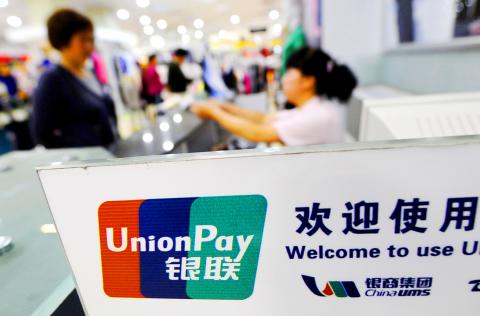Chinese bank card operator UnionPay (中國銀聯), which may soon have to defend its near-monopoly against Visa and MasterCard, faces a much bigger threat from online payment providers such as Alipay (支付寶), and is upgrading its systems to meet the danger.
Shored up by a raft of protectionist measures, the state-backed company has grown in just more than a decade from an unknown name to a true heavyweight, commanding 50.6 percent of all the global cards in circulation last year, according to the Nilson Report statistics newsletter.
China said last month it would open its credit-card market to foreign players following a WTO ruling in 2012 that it discriminated against US card firms.

Photo: Reuters
LOWER RATES
The prize for the foreign companies would be access to what is projected to become the biggest card market in the world by 2020. Transactions already reached about 32 trillion yuan (US$5.22 trillion) in China last year, People’s Bank of China data showed.
However, analysts say the obstacles to a successful foreign invasion of UnionPay’s dominant card position are considerable, as UnionPay charges merchants much lower rates than the Western card companies — as low as 0.04 percent, compared with MasterCard’s 0.6 to 1.85 percent in Britain for certain cards.
“The low rates in China will make entry by foreign players extremely difficult as business cases will not stack up, based on the lower rates,” said James McKeogh, a partner in consulting at KPMG China.
ALIPAY
A more immediate and perilous threat comes from online payment firms like Alipay, a unit of giant e-commerce company Alibaba Group Holding Ltd (阿里巴巴), which already dominates a parallel and growing payment universe that rivals the traditional card set-up.
In less than three years, Alipay has grown to control nearly half of China’s online third-party payment market, tapping the hundreds of millions of Chinese still without a credit card. That market commanded gross merchandise volume of 17.2 trillion yuan last year, according to estimates from iResearch.
UnionPay, on the other hand, commands a mere 11.9 percent of that market and faces competition from more than 250 new online providers that have been awarded licences from Beijing as it aims to stimulate consumer demand.
Alibaba told Bloomberg on Wednesday it was open to working with eBay Inc’s PayPal to expand its payment options, a plan that could magnify Alipay’s reach and put further pressure on UnionPay.
UnionPay is nevertheless putting up a fight. Last month it started working with airlines Lufthansa, Emirates, Etihad and Air Holland to provide payment services for online airline tickets through its cards for the first time.
In September, it teamed up with Samsung Electronics Co in near-field-communication payment (NFC), which lets users pay by tapping their phones on a device available at local shops.
However, Alipay is also trying to clinch a deal with Apple Inc on its own NFC payment system, a senior executive from Alibaba told the Wall Street Journal on Tuesday.

The Eurovision Song Contest has seen a surge in punter interest at the bookmakers, becoming a major betting event, experts said ahead of last night’s giant glamfest in Basel. “Eurovision has quietly become one of the biggest betting events of the year,” said Tomi Huttunen, senior manager of the Online Computer Finland (OCS) betting and casino platform. Betting sites have long been used to gauge which way voters might be leaning ahead of the world’s biggest televised live music event. However, bookmakers highlight a huge increase in engagement in recent years — and this year in particular. “We’ve already passed 2023’s total activity and

Nvidia Corp CEO Jensen Huang (黃仁勳) today announced that his company has selected "Beitou Shilin" in Taipei for its new Taiwan office, called Nvidia Constellation, putting an end to months of speculation. Industry sources have said that the tech giant has been eyeing the Beitou Shilin Science Park as the site of its new overseas headquarters, and speculated that the new headquarters would be built on two plots of land designated as "T17" and "T18," which span 3.89 hectares in the park. "I think it's time for us to reveal one of the largest products we've ever built," Huang said near the

China yesterday announced anti-dumping duties as high as 74.9 percent on imports of polyoxymethylene (POM) copolymers, a type of engineering plastic, from Taiwan, the US, the EU and Japan. The Chinese Ministry of Commerce’s findings conclude a probe launched in May last year, shortly after the US sharply increased tariffs on Chinese electric vehicles, computer chips and other imports. POM copolymers can partially replace metals such as copper and zinc, and have various applications, including in auto parts, electronics and medical equipment, the Chinese ministry has said. In January, it said initial investigations had determined that dumping was taking place, and implemented preliminary

Intel Corp yesterday reinforced its determination to strengthen its partnerships with Taiwan’s ecosystem partners including original-electronic-manufacturing (OEM) companies such as Hon Hai Precision Industry Co (鴻海精密) and chipmaker United Microelectronics Corp (UMC, 聯電). “Tonight marks a new beginning. We renew our new partnership with Taiwan ecosystem,” Intel new chief executive officer Tan Lip-bu (陳立武) said at a dinner with representatives from the company’s local partners, celebrating the 40th anniversary of the US chip giant’s presence in Taiwan. Tan took the reins at Intel six weeks ago aiming to reform the chipmaker and revive its past glory. This is the first time Tan